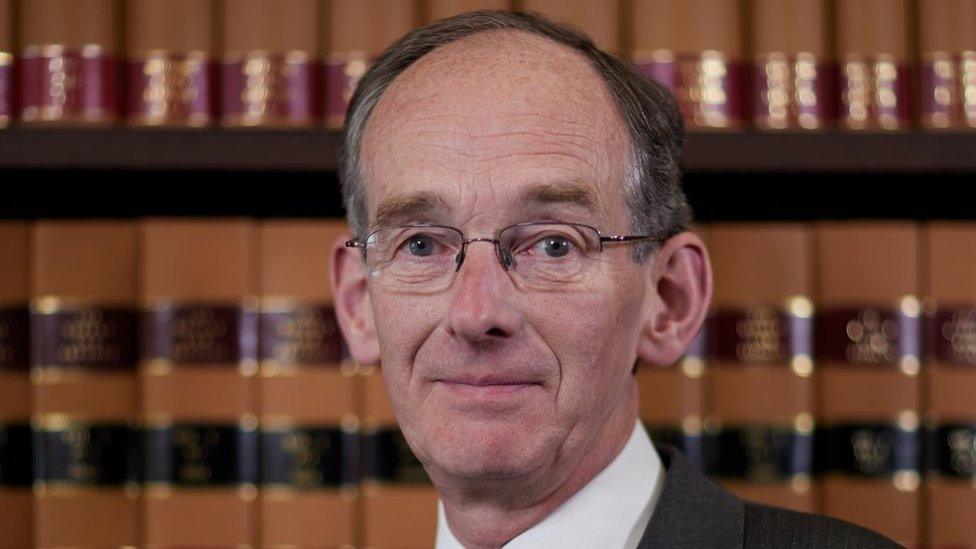Family of woman with Covid appeals against end-of-life ruling
- Published

Doctors who treated the woman at Addenbrooke's Hospital told a court hearing that life-support treatment was causing the patient distress
Relatives of a woman in her 50s left brain-damaged and paralysed after contracting Covid-19 said a judge "ignored" their wishes when he ruled she should be allowed to die.
The woman was admitted to Addenbrooke's Hospital in Cambridge in late 2020.
A judge agreed with specialists that no more could be done for her and life-support treatment should end.
Her family said she could "show degrees of emotion", and has appealed against the decision, asking for more time.
Specialists treating the woman at the hospital said she was the "most complicated" Covid patient in the world and recommended palliative care should begin.
Her relatives disagreed and said she could "feel and show degrees of emotion" and enjoyed watching EastEnders and Mr Bean.

Sir Andrew McFarlane is one of three judges who have been hearing the family's appeal
Mr Justice Hayden considered evidence at a recent hearing at the Court of Protection, where judges oversee hearings centred on adults who lack the mental capacity to make decisions, and concluded that life-support treatment should stop by the end of October.
He said it was the first time a judge had considered an end-of-life case as a result of Covid-19.
The family has now asked three judges at the Court of Appeal in London to overturn Mr Justice Hayden's decision, at the Court of Appeal in London.
Representing the relatives, barrister Edward Devereux QC told Sir Andrew McFarlane, the most senior Court of Protection judge in England and Wales, Lord Justice Moylan, and Sir Nicholas Patten, that Mr Justice Hayden had "erred".
Mr Justice Hayden had given "insufficient consideration" to the woman's "earlier capacitous decision" that she wanted "full escalation" of treatment and had failed to appreciate the "overwhelming importance" of her religious and cultural beliefs, Mr Devereux said.
He told the appeal hearing the woman "moves her head" and could communicate and respond to questions.
"When she finds something funny, she can pull a face. She likes being tickled," Mr Devereux said.
He added that the woman, who the Court of Protection ordered should not be identified, also enjoyed watching EastEnders on her iPad.
"She watches Netflix... she likes Mr Bean," he said.
'Almost entirely paralysed'
Mr Justice Hayden's ruling did not "reflect" evidence from "those closest" to the woman, Mr Devereux said.
He said evidence from her adult children was that she would have wanted to carry on living despite her circumstances.
"He ignored completely the evidence of the children, in written and oral form, about what their mother would like," Mr Devereux told the appeal hearing.
"The judge had cumulative, compelling evidence from those closest to [her] about what she would have wanted in her life.
"This is not reflected in the judgment."
Doctors had told Mr Justice Hayden that the woman, who was overweight and had underlying health conditions, had been the "most complicated" Covid-19 patient in the world.
Specialists at Addenbrooke's said there was nothing they could do to make "any aspect of her condition better" and that life-support treatment was causing her distress.
They thought she might only live a matter of months and a palliative care regime would enable her to die peacefully and without distress.
Mr Justice Hayden said it was the first time a judge had considered an end-of-life case as a result of Covid-19.
Barrister Katie Gollop QC, on behalf of the hospital, told the earlier hearing that the woman's case was "unique".
She said the woman, who is a grandmother, was "almost entirely paralysed" and had severe cognitive impairment.
One specialist said the woman had complications not "described" in the UK before.
Ms Gollop told the appeal judges Mr Justice Hayden has given "a thoughtful, detailed, nuanced judgment", and the appeal should be dismissed.
Lawyers said life-support treatment would continue until the Court of Appeal case reached its conclusion.
The three judges said they would announce their decision in the near future.

Find BBC News: East of England on Facebook, external, Instagram, external and Twitter, external. If you have a story suggestion email eastofenglandnews@bbc.co.uk, external